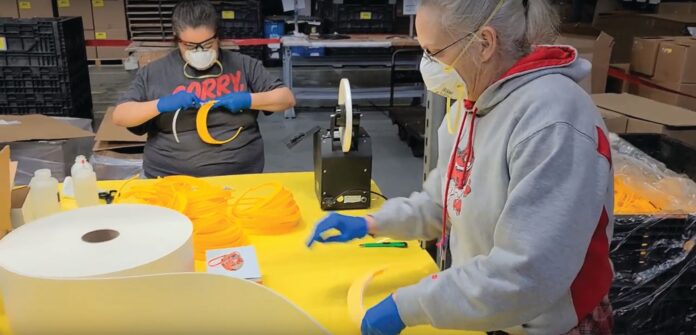
Engineered Plastic Components began producing FDA-compliant face shields at its Grinnell facility on April 3 as part of a University of Iowa-led effort to procure vital protective gear for medical workers. CREDIT EPC
By Katharine Carlon
[email protected]
An effort that began with an informal group of companies and organizations 3D-printing face shields to protect frontline medical workers has grown into a statewide operation capable of producing as many as 250,000 FDA-compliant shields to assist in the coronavirus pandemic.
Two Iowa manufacturers, Vantec Inc. of Webster City and Engineered Plastic Components Inc. of Grinnell, have joined a University of Iowa-led initiative to produce FDA-compliant face shields, answering the call for critical personal protective equipment (PPE) as health workers battle COVID-19 amid persistent supply chain issues.
“I moved back home to Iowa partially because I was drawn to this supportive farm culture character trait embedded in our DNA,” said Jon Darsee, the UI’s chief innovation officer, who assembled a team to respond when hospitals began reporting PPE shortages. That included the UI’s Protostudios printing lab, led by Neil Quellhorst, and Iowa MADE, a UI manufacturing and e-commerce initiative headed by Executive Director Jordan Kaufmann.
“I am elated and amazed at the willingness to help,” Mr. Darsee said. “I’m more amazed at the speed at which the help arrived. It demonstrates that the best in humanity can surface at the worst of times.”
The effort began in early March when Mr. Quellhorst met with physicians at University of Iowa Hospitals & Clinics to begin prototyping a face shield design to their specifications. After assembling its own production operation made up of redirected university employees at the UI’s BioVenture Center in Coralville, the team shared the design with NewBoCo’s Eric Engelmann, who helped form a volunteer network capable of 3D printing what Mr. Quellhorst called “handmade masks.”
That “temporary, stopgap” solution, as Mr. Engelmann referred to it on the Iowa COVID Rapid Response Network Facebook page, had already sent 6,000 printed hybrid and disposable masks out the door as of early last week.
“Face shields come in two types,” Mr. Quellhorst explained. “The first category includes almost any type of ‘handmade’ device. The second category is an FDA-compliant device which Protostudios/MADE is fabricating and selling.”
Mr. Darsee said that while the local efforts created a “critical early supply of shields,” 3D printing is slow and expensive, prompting his team to begin interviewing manufacturers capable of creating an injection-molded part and mass producing the “halo” part of the shield. Thanks to an introduction from Iowa Economic Development Director Debi Durham, the team connected with Vantec President and CEO Sherri Behrendt, who “jumped all over the idea.”
“Within 10 days we had parts in-hand at or below their cost,” Mr. Darsee said, adding that because face shields are a Class I-regulated device, final assembly of shields, including the halo, was taking place at MADE, which is FDA-registered. The 100% student-run program oversees design, manufacturing, quality control and online sale of simple medical tools solving unmet needs as identified by UI faculty.
“When the president had that call to action asking for manufacturers around the country to help, I reached out,” said Ms. Behrendt, who connected with UI officials about three weeks ago and had a tool in place and production online within a week. “The faster we turned this around, the faster we could save lives.”
Ms. Behrendt said Vantec, which typically plays a behind-the-scenes role as a maker of plastic components for branded products, was on track to soon complete its initial run of 40,000 halos.
“This is within our specialty and as someone born on the Fourth of July, I’m patriotic,” she added. “When your country asks for your help and it’s something we can do, it just makes sense to help.”
Mr. Darsee said his team connected with Engineered Plastic Components (EPC) through Matt Warrens, managing director of innovation for UnityPoint Health, who has been a close collaborator in the UI effort. EPC, which is an FDA-cleared manufacturer of plastic injection molded products, will be manufacturing the entire face shield at its Grinnell plant.
EPC President and CEO Reza Kargarzadeh said EPC, a 26-year-old company that spans 16 locations in 10 states, including two in Iowa, built an injection molded tool within a short time and went into full production on April 3. EPC has already shipped 5,000 units to UnityPoint Health and an additional 1,000 to the Federal Emergency Management Agency in Washington. He plans to donate some shields to senior housing facilities in the Grinnell area.
“This is the right thing to do and it’s in our wheelhouse,” said Mr. Kargarzadeh, who estimates the facility will produce 10,000-15,000 shields weekly and is “geared up” to produce as many as 100,000. “We were able to use our technology and knowledge to do this very quickly. We want to make sure as corporate citizens, we’re providing input and solutions in this important situation.”
“The offers from all corners of the state of equipment, material, and intellect have been gratifyingly overwhelming, including both Iowa State and UNI,” said Mr. Quellhorst, who expects the BioVentures Center to produce anywhere between 30,000-80,000 additional shields before exhausting its supply of raw materials.
Mr. Darsee said that with face shield operations underway, his innovation team is now exploring production of other scarce supplies, working with the UI colleges of Engineering and Public Health on a face mask design that could meet the N95 standard, and with UI doctor and professor Dr. David Kaczka, founder of Oscilivent, a spinout that aims to create the next generation of ventilators.
“Our mission is to facilitate innovation on campus, and while this crisis poses unique challenges, opportunities to rapidly coalesce collaboration and ingenuity from a variety of sources is abundant,” Mr. Darsee said. “Folks across the Corridor are focused. It is very encouraging in light of the disruption, uncertainty and frightening times.”
Other companies join the fight
The University of Iowa and its partners aren’t the only ones stepping up to produce much- needed equipment during the coronavirus pandemic.
Alliant Energy has partnered with a team of Iowa State University students to manufacture and distribute up to 2,000 face shields to medical professionals at hospitals across the state, funding 3D printing and supplies at ISU’s Computation and Construction Lab within the College of Design.
Closer to home, Fire Farm Lighting of Elkader has created Fire Farm Fabrication to create face shields and protective intubation enclosures (PIE) for health care professionals. The PIEs, being distributed through Hiawatha-based Cope Plastics, were requested by Mercy Hospital in Iowa City and are being used to contain virus-laden droplets while intubating a patient.
Also in Hiawatha, an employee of tech manufacturer Crystal Group is using the company’s manufacturing capabilities to print critical PPE parts. Engineer Wes Allensworth has produced essential elements for nearly 100 face shields, and donated them to UnityPoint Health – St. Luke’s Hospital. CBJ




